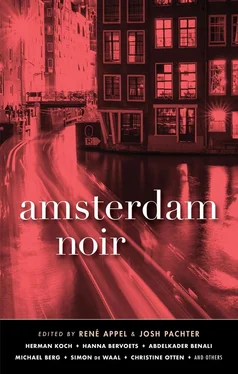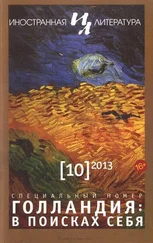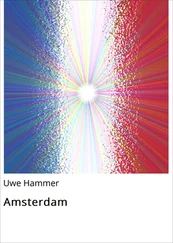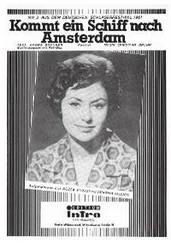Герман Кох - Amsterdam Noir
Здесь есть возможность читать онлайн «Герман Кох - Amsterdam Noir» весь текст электронной книги совершенно бесплатно (целиком полную версию без сокращений). В некоторых случаях можно слушать аудио, скачать через торрент в формате fb2 и присутствует краткое содержание. Город: New York, Год выпуска: 2018, ISBN: 2018, Издательство: Akashic Books, Жанр: Детектив, на английском языке. Описание произведения, (предисловие) а так же отзывы посетителей доступны на портале библиотеки ЛибКат.
- Название:Amsterdam Noir
- Автор:
- Издательство:Akashic Books
- Жанр:
- Год:2018
- Город:New York
- ISBN:978-1-61775-685-6
- Рейтинг книги:4 / 5. Голосов: 1
-
Избранное:Добавить в избранное
- Отзывы:
-
Ваша оценка:
- 80
- 1
- 2
- 3
- 4
- 5
Amsterdam Noir: краткое содержание, описание и аннотация
Предлагаем к чтению аннотацию, описание, краткое содержание или предисловие (зависит от того, что написал сам автор книги «Amsterdam Noir»). Если вы не нашли необходимую информацию о книге — напишите в комментариях, мы постараемся отыскать её.
Amsterdam Noir — читать онлайн бесплатно полную книгу (весь текст) целиком
Ниже представлен текст книги, разбитый по страницам. Система сохранения места последней прочитанной страницы, позволяет с удобством читать онлайн бесплатно книгу «Amsterdam Noir», без необходимости каждый раз заново искать на чём Вы остановились. Поставьте закладку, и сможете в любой момент перейти на страницу, на которой закончили чтение.
Интервал:
Закладка:
The prospective purchaser of my house wore a fine Italian suit — Corneliani, Bert told me later. His face seemed vaguely familiar, like other people with money and power. The realtor asked him if he’d read the contract carefully.
The man nodded.
“Any questions or amendments?”
We both shook our heads.
After we signed, the realtor quite properly congratulated de Vries on his purchase and me on my sale.
“Now I have a question,” I said to de Vries. “Why did you want me out? Why couldn’t I go on living there?”
De Vries, the realtor, and Bert all looked at me with raised eyebrows.
De Vries got up, gave the realtor an ice-cold glare, and headed for the door.
“When will Ella be released?” I called after him.
He turned and said, “You never should have bought that building in the first place.”
And he left the office.
Bert was furious at me. Theo too, though he did a better job of holding it in. They were right, of course: I should have just played the game for the sake of Ella’s safety. However, a week later — as promised — a new video was delivered to De Telegraaf . Bert and I watched it together with Theo at the Lijnbaansgracht police station.
No Ella. Where I’d expected to see her face, light with relief, I saw instead myself, in tears, Bert’s arm around me. We were crossing the Spui, approaching my house. Bert squeezed my shoulder, I wiped my cheeks. Without our noticing, someone had managed to film us on our way back from the realtor’s office. The video ended with one sentence of typed text: She will be released the day after the closing.
That evening, I thanked Bert for taking care of me by cooking dinner for once. We raised more than one glass to Ella’s upcoming release, but we didn’t talk about it much, as if our words might jinx her. After the third toast, I dared to ask when he planned to publish his story.
“Pretty soon. It’s almost done. When they let her go, she’ll call you first, then me. As soon as I hear from her, I’ll post the article online. We’ll save her piece for the print edition. That’ll be the most important account, obviously.”
In his journalist’s mind, he was already looking beyond the actual release. That didn’t surprise me: Ella is exactly the same.
Movers came to put my things in storage, and I carried a suitcase of clothes and toiletries to Ella’s apartment on the Singel without looking back.
I didn’t want to go to the closing, and I could have given a notary my power of attorney. But I went. The buyer ignored my stare, signed the final papers, and left without a word.
I walked back to the Spui for a sort of final goodbye, and saw him sitting on a bench outside the bookstore.
“Do you have a place to go,” he asked, getting slowly to his feet, “or will you squat again?”
It was only then that I recognized him from all those years ago. Jan de Vries had begun his career as a slumlord on the Spui.
“I didn’t like the two of you then,” he said, “and I don’t like you now.”
And he turned away and crossed the square to a chauffeured limo that was waiting for him.
The brothers who murdered Mimi and Mark had told the truth. They weren’t Hells Angels, and what happened wasn’t an initiation gone out of control. They’d been hired to toss a pair of squatters out of a house, and that was what had gone out of control.
Theo cursed up a storm, immediately assigned a team of detectives to investigate de Vries, and promised me the man would never get away with it. That was a comforting thought, although I knew it was an empty promise as long as Ella was still in the man’s hands.
Bert rewrote his lead and came up with a new headline: “REAL-ESTATE MAGNATE SUSPECTED OF SPUI MURDERS.”
The article would go live the moment Ella was released.
After the closing, I decided to clean Ella’s apartment, just to have something to do. The next morning at daybreak, I began preparing for her return.
April 2017
It’s now a year since Bert’s article nailed the ex-slumlord to the cross. After he published it, he went on to write an entire series of stories about the Amsterdam real-estate mafia, partly with the help of Ella’s notes.
But Theo Mann was unable to keep his promise: Jan de Vries made a clean getaway before the police showed up to arrest him. He’s now living large — and not exactly incognito — in a country that has no extradition treaty with The Netherlands.
On the first Sunday of every month, early in the morning, while the city sleeps, I’ve gotten into the habit of walking down the Spui and along the Rokin to the Doelensluis, where I can stand on the bridge and watch the Amstel River flow slowly by.
It’s been so long since I last heard from Ella that I imagine her prediction must have come true.
This story was inspired by an actual Amsterdam murder case.
Ankle Monitor
by Herman Koch
Translated by Sam Garrett
Watergraafsmeer
Maybe it was a mistake to go back to my old neighborhood on the very first day of a weekend leave. I could have been imagining it, but I seemed to read it off the faces of the people I came across on the street: how they glanced up at me, walked on, then took another look. I avoided the butcher shop and the bakery I used to go to. I bought a couple of buns, some sliced liver, and salted beef at the Albert Heijn on Christiaan Huygensplein — the girls at the registers were too young to remember, they were just as friendly to me as they were to everyone else.
When I walked into Elsa’s Café, though, conversations literally slammed to a halt. That’s what I was that first day: a conversation killer. I’m not a complete bonehead, I was more or less prepared for it, but it’s still weird when it actually happens. At Elsa’s they have these swinging doors, like a saloon in an old western. That’s the way it felt to me: as though I was coming through the swinging doors, six-guns drawn, to settle an old account. And in a certain sense I was, but not with the people who were there, not with anyone who was at Elsa’s right then.
I don’t know what I would have done, though, if he had been standing there, prattling at the bar with a beer in his hand. Then I wouldn’t have been fully accountable. In fact, I’ve never been accountable for my actions — not being accountable is the thin red line in my life that’s taken me everywhere, from the maximum-security facility to here again, now, in my old neighborhood.
There are about twenty of us in there, in what you’d probably call an “open block.” Open to the extent that we don’t have to stay in our cells between nine and six, but can just wander the corridors. In fact, it’s only one corridor, a broad one, sure, more than thirty feet across. Everyone on both sides of it has his door open, some of us hang our laundry out to dry on a rack in the corridor. When you look in, the cells are like you’d expect: girlie posters on the walls, a little desk with a couple of books, an outdated desktop computer. A few of the guys don’t have any photos or posters at all, so that’s clear enough: posters of half-naked men or boys would send the wrong signal on our block.
At one end of the corridor is the rec room, with Ping-Pong and foosball tables and a row of shelves with games: Risk, Monopoly, that kind of thing. And about five decks of playing cards, with a couple of cards missing from each deck.
At the other end of the corridor is the point where our open block stops, clearly marked with bars and the kind of massive wired glass you couldn’t bust through, not even with an ax. As though anyone here has an ax in his cell! No, but we do have other things, things I’m not going to talk about here, I’m not out to rat on anyone. What am I saying: I’m not out to rat on myself! Later, when I go back on Monday, maybe I’ll need those things again — I hope not, but you never know. It’s good to have them, the mere thought of those things and what you can do with them is what keeps you calm.
Читать дальшеИнтервал:
Закладка:
Похожие книги на «Amsterdam Noir»
Представляем Вашему вниманию похожие книги на «Amsterdam Noir» списком для выбора. Мы отобрали схожую по названию и смыслу литературу в надежде предоставить читателям больше вариантов отыскать новые, интересные, ещё непрочитанные произведения.
Обсуждение, отзывы о книге «Amsterdam Noir» и просто собственные мнения читателей. Оставьте ваши комментарии, напишите, что Вы думаете о произведении, его смысле или главных героях. Укажите что конкретно понравилось, а что нет, и почему Вы так считаете.












